Overview
- Brief Narrative
- Leather gun belt used by Dudo Montiljo, while he was a member of a partisan group that fought the Ustaše and the Nazi occupation forces in Yugoslavia during World War II. Dudo lived in Prnjavor, where he worked as a merchant when Yugoslavia was invaded and partitioned by Germany and its allies in April, 1941. After the Yugoslav surrender, Dudo joined the 3rd battalion of the 10th Brigade of the People's Liberation Army (Yugoslav partisans). While fighting with the partisans Dudo lost three fingers, including the second and third fingers of his right hand. After his recovery, Dudo worked in the People’s Liberation Committee in Hercegovina until the end of the war. The Germans and their Croatian Ustaše collaborators deported and killed Dudo’s mother, Rahele, and his four siblings, Rene, Klare, Smoela, and Morica.
- Date
-
use:
1941-1945
- Geography
-
use:
Yugoslavia
- Credit Line
- United States Holocaust Memorial Museum Collection, Gift of the Federation of Jewish Communities in Yugoslavia
- Contributor
-
Subject:
Dudo Montiljo
Previous owner: Dudo Montiljo
- Biography
-
Duda Montiljo (birth name Leon Montiljo, 1909-1995) was born in Visoko, Austria Hungary (now Bosnia and Herzegovina) to Jakob and Rahele Montiljo. As an adult, he settled in Prnjavor and worked as a merchant. On April 6, 1941, Germany and Italy, supported by Hungary and Bulgaria, invaded Yugoslavia. Yugoslavia was partitioned, and central Yugoslavia, including Prnjavor, was formed into the independent State of Croatia, which was governed by the Ustaše and administered by the Germans. The regime enacted anti-Jewish laws, confiscated property and money, forced males to work hard labor and then began deporting Jews to camps. Dudo’s mother, Rahele, and his four siblings, Rene, Klare, Smoela, and Morica were deported to and killed in the camps.
In 1943, Dudo joined the 3rd battalion of the 10th Brigade of the People's Liberation Army (Yugoslav partisans). He fought with the partisans in Yugoslavia during the war and lost three fingers, including the second and third fingers of his right hand. After recovery, Dudo worked in the People’s Liberation Committee in Hercegovina until the end of the war. After the war he retired from the military a lieutenant and was recognized as a disabled veteran due to his injuries. He was married to Anica Finci.
Physical Details
- Classification
-
Dress Accessories
- Category
-
Belts (Clothing)
- Object Type
-
Belts (Clothing) (lcsh)
- Genre/Form
- Belts (Clothing)
- Physical Description
- Light brown, leather belt with a silver-colored, rounded, rectangular framed buckle and prong. The leather is looped around the buckle’s central bar and held with two small rivets. The belt is long and thin, and the opposite end tapers to a slightly narrower end, with nine small machine-made holes in the center for the buckle. The front of the belt has a faint, stamped farm scene depicting a cowboy inside a fenced in pasture swinging a lasso at a running horse with several other horses standing nearby. In the background is a three rail fence with undulating hills in the distance. The scene repeats three times over the length of the belt. Near the end, there are two vertical indentations at the seventh and eighth holes from the belt being worn over time. The buckle has some light green staining.
- Dimensions
- overall: Height: 2.000 inches (5.08 cm) | Width: 42.250 inches (107.315 cm)
- Materials
- overall : leather, metal
Rights & Restrictions
- Conditions on Access
- No restrictions on access
- Conditions on Use
- No restrictions on use
Keywords & Subjects
Administrative Notes
- Legal Status
- Permanent Collection
- Provenance
- The belt was donated to the United States Holocaust Memorial Museum in 1993 by the Federation of Jewish Communities in Yugoslavia.
- Record last modified:
- 2022-07-28 18:22:13
- This page:
- https://collections.ushmm.org/search/catalog/irn7330
Download & Licensing
In-Person Research
- By Appointment
- Request 21 Days in Advance of Visit
- Plan a Research Visit
- Request to See This Object
Contact Us
Also in Yugoslavian Partisan collection
The collection consists of certificates, identification papers, medical records, photographs, medals, and guns relating to the experiences of Dudo Montiljo, Vladimir Carin, and Dr. Lavoslav Kadelburg with Yugoslavian partisans during World War II.
Date: 1923-1973
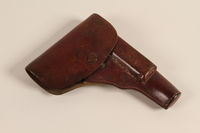
Handgun holster used by a Yugoslavian partisan
Object
Leather pistol holster used by Dudo Montiljo, while he was a member of a partisan group that fought the Nazi occupation forces and Ustaše collaborators in Yugoslavia during World War II. Dudo lived in Prnjavor, where he worked as a merchant when Yugoslavia was invaded and partitioned by Germany and its allies in April, 1941. After the Yugoslav surrender, Dudo joined the 3rd battalion of the 10th Brigade of the People's Liberation Army (Yugoslav partisans). While fighting with the partisans Dudo lost three fingers, including the second and third fingers of his right hand. After his recovery, Dudo worked in the People’s Liberation Committee in Hercegovina until the end of the war. The Germans and their Croatian Ustaše collaborators deported and killed Dudo’s mother, Rahele, and his four siblings, Rene, Klare, Smoela, and Morica.
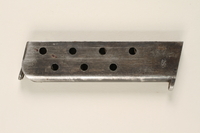
Handgun magazine used by a Yugoslavian partisan
Object
Browning Model 1922 pistol magazine used by Dudo Montiljo, while he was a member of a partisan group that fought the Nazi occupation forces and Ustaše collaborators in Yugoslavia during World War II. The Model 1922 was developed by American gun designer, John Browning, and manufactured in Belgium by Fabrique Nationale. The gun was adopted by many European militaries, including Yugoslavia, and appropriated by Germany after their occupation of Belgium during World War II. Dudo lived in Prnjavor, where he worked as a merchant when Yugoslavia was invaded and partitioned by Germany and its allies in April, 1941. After the Yugoslav surrender, Dudo joined the 3rd battalion of the 10th Brigade of the People's Liberation Army (Yugoslav partisans). While fighting with the partisans Dudo lost three fingers, including the second and third fingers of his right hand. After his recovery, Dudo worked in the People’s Liberation Committee in Hercegovina until the end of the war. The Germans and their Croatian Ustaše collaborators deported and killed Dudo’s mother, Rahele, and his four siblings, Rene, Klare, Smoela, and Morica.
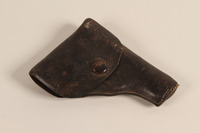
Pistol holster used by a Yugoslavian partisan
Object
Leather holster acquired by Lavoslav Kadelburg, while fighting in the Soviet Army against Germany in 1945. Lavoslav disarmed a German officer, likely from the Estonian SS, and kept the accompanying pistol and holster. Lavoslav was a lawyer in Zagreb when he was mobilized as a reserve officer in the Royal Yugoslav Army, in order to help defend against the Axis invasion in April 1942. Yugoslavia was overwhelmed, the army was disbanded, and Lasoslav was captured by the Nazis and taken back to Germany as a prisoner of war. He was held in Oflag VI C, a prisoner of war camp in Osnabrück-Eversheide. There, he became a member of the Antifascist Committee which combated the cruel treatment of the prisoners by the camp authorities. Later, Lavoslav was transferred to Barkenbrugge camp in Eastern Prussia, near the former Polish border. In January 1945, Barkenbrugge was evacuated before the advancing Soviet Army. Lavoslav escaped with many other prisoners and helped the Soviets fight the Germans. In March 1945, Lavoslav returned to Yugoslavia and joined the Narodnooslobodilački pokret (NOP, People's Liberation Movement). After the war, Lavoslav helped rehabilitate survivors of the Holocaust and served in a number of sociopolitical organizations and top level government positions. Through these roles, he became one of the most influential and powerful figures in the Jewish community of Yugoslavia.
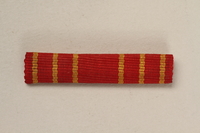
Yugoslav Orden za Hrabrost ribbon bar awarded to a Yugoslavian partisan
Object
Yugoslav Медаље за Храброст (Order of Bravery) ribbon bar awarded to Dudo Montiljo on April 1, 1949, in recognition for his efforts as a partisan during the Axis occupation of Yugoslavia from 1941 to 1945. The medal was instituted on August 15, 1943, and awarded to both military personnel and civilians for acts of bravery during World War II. The motto of the Yugoslavian partisan movement, “Death to fascism, freedom to the people” is embossed on the face. Dudo lived in Prnjavor, where he worked as a merchant when Yugoslavia was invaded and partitioned by Germany and its allies in April, 1941. After the Yugoslav surrender, Dudo joined the 3rd battalion of the 10th Brigade of the People's Liberation Army (Yugoslav partisans). While fighting with the partisans Dudo lost three fingers, including the second and third fingers of his right hand. After his recovery, Dudo worked in the People’s Liberation Committee in Hercegovina until the end of the war. The Germans and their Croatian Ustaše collaborators deported and killed Dudo’s mother, Rahele, and his four siblings, Rene, Klare, Smoela, and Morica.
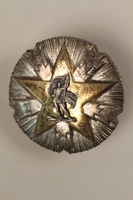
Orden Zasluge Za Narod 3rd class awarded to a Yugoslavian partisan
Object
Yugoslav Ордена Заслуге за Народ III р. (Order of Merit to the Nation (People), 3rd class), awarded to Vlaimir Carin in recognition of his service as a partisan during the Axis occupation of Yugoslavia from 1941 to 1945. The medal was awarded to those who distinguished themselves in the struggle for liberation and merit in securing and organizing the Yugoslav government and army, and for achievement in the economic, cultural, and social spheres. Vladimir was working as a graphic artist in Zagreb, Yugoslavia when Germany and its allies invaded and occupied the country on April 6, 1941. Central Yugoslavia, including Zagreb, was formed into the independent state of Croatia, ruled by the Ustasa. After the invasion, Vladimir fled to Split, where he was captured by the Italians and transported to the island of Korčula. While on Korčula, he organized participation in the sabotage detachment of the island’s partisan group. In September 1943, Vladimir joined the narodnooslobodilački vojska (NOV, People's Liberation Army) and fought in the 3rd Overseas Brigade and partisan detachments in Yugoslavia. After the surrender of Italy, Vladimir was head of the Agitaciene propaganda department and was a Zemaljsko antifašističko vijeće narodnog oslobođenja Hrvatske (ZAVNOH, State Anti-fascist Council for the National Liberation of Croatia) war correspondent. After the war, he worked as a journalist, film and TV director, and writer.
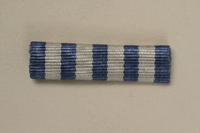
Blue and white striped ribbon bar for a Yugoslavian partisan
Object
Yugoslav Medalja za Hrabrost (Medal for Bravery) ribbon bar, awarded to Vlaimir Carin in recognition of his service as a partisan during the Axis occupation of Yugoslavia from 1941 to 1945. The medal was awarded to partisans and civilians for acts of bravery during both peace and wartime. Vladimir was working as a graphic artist in Zagreb when Germany and its allies invaded and occupied Yugoslavia on April 6, 1941. Central Yugoslavia, including Zagreb, was formed into the independent state of Croatia, ruled by the Ustasa. After the invasion, Vladimir fled to Split, where he was captured by the Italians and transported to the island of Korčula. While on Korčula he organized participation in the sabotage detachment of the island’s partisan group. In September 1943, Vladimir joined the narodnooslobodilački vojska (NOV, People's Liberation Army) and fought in the 3rd Overseas Brigade and Partisan detachments in Yugoslavia. After the surrender of Italy, Vladimir was head of the Agitaciene propaganda department and was a Zemaljsko antifašističko vijeće narodnog oslobođenja Hrvatske (ZAVNOH, State Anti-fascist Council for the National Liberation of Croatia) war correspondent. After the war he worked as a journalist, film and TV director and a writer.
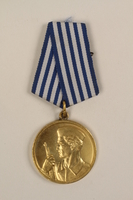
Medalja za Hrabrost awarded to a Yugoslavian partisan
Object
Yugoslav Medalja za Hrabrost (Medal for Bravery), awarded to Vlaimir Carin in recognition of his service as a partisan during the Axis occupation of Yugoslavia from 1941 to 1945. The medal was awarded to partisans and civilians for acts of bravery during both peace and wartime. Vladimir was working as a graphic artist in Zagreb when Germany and its allies invaded and occupied Yugoslavia on April 6, 1941. Central Yugoslavia, including Zagreb, was formed into the independent state of Croatia, ruled by the Ustasa. After the invasion, Vladimir fled to Split, where he was captured by the Italians and transported to the island of Korčula. While on Korčula he organized participation in the sabotage detachment of the island’s partisan group. In September 1943, Vladimir joined the narodnooslobodilački vojska (NOV, People's Liberation Army) and fought in the 3rd Overseas Brigade and Partisan detachments in Yugoslavia. After the surrender of Italy, Vladimir was head of the Agitaciene propaganda department and was a Zemaljsko antifašističko vijeće narodnog oslobođenja Hrvatske (ZAVNOH, State Anti-fascist Council for the National Liberation of Croatia) war correspondent. After the war he worked as a journalist, film and TV director, and writer.
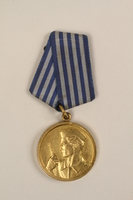
Medalja za Hrabrost awarded to a Yugoslavian partisan
Object
Yugoslav Medalja za Hrabrost (Medal for Bravery) ribbon bar, awarded to a Yugoslav partisan fighter. The medal was instituted on August 15, 1943, and awarded to both partisans and civilians in peace and wartime for acts of bravery. The face features an image of a uniformed partisan soldier. On April 6, 1941, Germany and its allies, Italy, Hungary and Bulgaria invaded and partitioned Yugoslavia. Many Jews and ethnic minorities were persecuted and targeted by the authorities with many sent to camps or killed. In the face of this brutality, local populations formed resistance groups to combat the occupying forces. The largest was the Partisans, led by Josip ‘Tito’ Broz. The Partisan’s goal was to establish a socialist nation. More than 4,500 Jews served in the partisan resistance movement and approximately 1,300 died in combat.
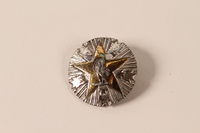
Orden Zasluge Za Narod 3rd class awarded to a Yugoslavian partisan
Object
Yugoslav Ордена Заслуге за Народ III р. (Order of Merit to the Nation (People), 3rd class), awarded to Dudo Montiljo on April 1, 1949, in recognition of his service as a partisan during the Axis occupation of Yugoslavia from 1941 to 1945. The medal was awarded to those who distinguished themselves in the struggle for liberation and merit in securing and organizing the Yugoslav government and army, and for achievement in the economic, cultural and social spheres. Dudo lived in Prnjavor, where he worked as a merchant when Yugoslavia was invaded and partitioned by Germany and its allies in April, 1941. After the Yugoslav surrender, Dudo joined the 3rd battalion of the 10th Brigade of the People's Liberation Army (Yugoslav partisans). While fighting with the partisans Dudo lost three fingers, including the second and third fingers of his right hand. After his recovery, Dudo worked in the People’s Liberation Committee in Hercegovina until the end of the war. The Germans and their Croatian Ustaše collaborators deported and killed Dudo’s mother, Rahele, and his four siblings, Rene, Klare, Smoela, and Morica.
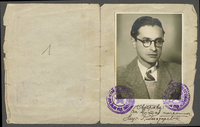
Dudo Montiljo papers
Document
The Dudo Montiljo papers consist of certificates, identification papers, medical records, and photographs documenting Montiljo’s service with the Yugoslav partisans during World War II, the wounds he received, his service awards and medals, a damaged gun claimed as a war trophy during the war, and trees he planted in the Martyrs’ Forest in Israel in honor of his mother, brothers, and sisters.
Fabrique Nationale Browning Model 1922 used by a Yugoslavian partisan
Object
Browning Model 1922 pistol used by Dudo Montiljo, while he was a member of a partisan group that fought the Nazi occupation forces and Ustaše collaborators in Yugoslavia during World War II. The Model 1922 was developed by American gun designer, John Browning, and manufactured in Belgium by Fabrique Nationale. The gun was adopted by many European militaries, including Yugoslavia, and appropriated by Germany after their occupation of Belgium during World War II. Dudo lived in Prnjavor, where he worked as a merchant when Yugoslavia was invaded and partitioned by Germany and its allies in April, 1941. After the Yugoslav surrender, Dudo joined the 3rd battalion of the 10th Brigade of the People's Liberation Army (Yugoslav partisans). While fighting with the partisans Dudo lost three fingers, including the second and third fingers of his right hand. After his recovery, Dudo worked in the People’s Liberation Committee in Hercegovina until the end of the war. The Germans and their Croatian Ustaše collaborators deported and killed Dudo’s mother, Rahele, and his four siblings, Rene, Klare, Smoela, and Morica.
6.35mm Mauser 1934 pocket pistol acquired by a Yugoslavian partisan
Object
Mauser 1934 pocket pistol acquired by Lavoslav Kadelburg, while fighting in the Soviet Army against Germany in 1945. Lavoslav disarmed a German officer, likely from the Estonian SS, and kept the pistol. Lavoslav was a lawyer in Zagreb when he was mobilized as a reserve officer in the Royal Yugoslav Army, in order to help defend against the Axis invasion in April 1942. When Yugoslavia surrendered, the army was disbanded, and Lasoslav was captured by the Nazis and taken back to Germany as a prisoner of war. He was held in Oflag VI C, a prisoner of war camp in Osnabrück-Eversheide. There, he became a member of the Antifascist Committee which combated the cruel treatment of the prisoners by the camp authorities. Later, Lavoslav was transferred to Barkenbrugge camp in Eastern Prussia, near the former Polish border. In January 1945, Barkenbrugge was evacuated before the advancing Soviet Army. Lavoslav escaped with many other prisoners and helped the Soviets fight the Germans. In March 1945, Lavoslav returned to Yugoslavia and joined the Narodnooslobodilački pokret (NOP, People's Liberation Movement). After the war, Lavoslav helped rehabilitate survivors of the Holocaust and served in a number of sociopolitical organizations and top level government positions. Through these roles, he became one of the most influential and powerful figures in the Jewish community of Yugoslavia.



